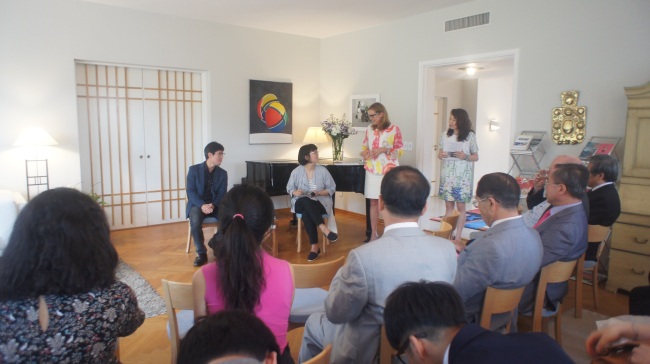A chronic inability to talk to attractive women can eventually reap rewards. That was the takeaway message from author Cheon Myeong-kwan as he addressed the Seoul Literary Society at the Swedish Ambassador’s residence in Seongbuk last week.
Thirty years ago, the now critically acclaimed novelist lived a markedly less glamorous life. The only gig he could find was selling golf clubs, and he had to mooch off friends just to get by. Chronically miserable, his only source of joy was riding the bus and exchanging glances with the “young and pretty” females en route to their university each day. Without a college degree though, the working-class salesman lacked the confidence to muster up so much as a “hello.”
“They were intelligent and passionate young people,” Cheon said. “I never had the courage to talk or strike up a conversation with any of them because I was from a different social class.”
Determined to impress, the young man began to jot down the names of the books they were carrying. With complex terms such as, “Labor Emancipation,” the reading made his eyes water. Within a few months though, the question “What are the biggest ironies faced by Korean society?” replayed in his mind.
“It gave me a new perspective on life, because up until then I had no-one to call a colleague or teacher,” he said. “I asked myself fundamental questions about how the world was structured and the hierarchies that exist and what could be done to overcome them.”
Such questions form the basis for the author’s most famous work. In “Homecoming,” which was recently translated into English, the 53-year-old paints a dark and dystopian vision of a postmodern Seoul. Production of goods is dead, organ trafficking booms, capitalism is an official language, and people live in slums or sanctioned as wards of the state.
“If you think about the present as an extension of the past, that gives you some idea of where we are headed,” he said. “It is rather depressing but I think it is the role and responsibility of literature to convey those kinds of messages.”
 |
Korean novelist Cheon Myeong-kwan speaks at the Seoul Literary Society meeting held at the Swedish Ambassador’s residence in Seoul on Tuesday. (Embassy of Sweden in Seoul) |
Unabashedly holding up a mirror to society’s failings is arguably Cheon’s greatest artistic strength. Growing up in a poorer household, he struggled to relate to the privileged intellectuals and elites rife in Korean literature. After learning that half the world’s wealth lies in the hands of just 1 percent of the population, the author decided it was time to serve the majority’s interests instead.
“The unemployment rate is rising as firms are not offering permanent positions anymore,” he said. “In this book I wanted to highlight how people suffer job insecurity, deal with unrest in society, and how this does not leave much room for hope.”
It took a long time to get in this head-space though. At 40, Cheon found himself burnt out after years trying to break into Korea’s Tinseltown, Chungmuro. His screenplays were receiving no funding, so he impulsively tried his hand at a novel instead. Without any expectations of grandeur weighing him down, the words flowed neatly onto the pages. The short story, “Frank and I,” was born, winning the prestigious Munhakdongne New Writer’s Award in 2003. A year later, “Whale,” received the Munhakdongne Novel Award.
Though fictional, one of the plots follows an eerily true-to-life theme. A gangster desperately tries to woo a beautiful geisha who insists he prove his worth first. After he succeeds and lands a passionate night with his love, he wakes up to find an elderly woman in her place. Rather than feel duped though, the protagonist realizes it is this “real woman” he has been yearning for all along.
Perhaps this is Cheon’s cheeky homage to the women he was so easily intimidated by back in those early bus-riding days. Having achieved success through novels, “It’s a Man’s World,” and, “My Uncle, Bruce Lee,” in addition to “Modern Family” taking to the big-screen in the 2013’s hit movie, “Boomerang Family,” it could also be a gentle nod to all the female attention he has enjoyed since fame welcomed him home.
“By the time I made it as a novelist those girls were all married women in their 40s raising families,” he said with laughter. “Maybe we realize some things too late in life, like maybe men shouldn’t go through quite so much trouble for a girl.”
How deliciously ironic that were it not for all the “trouble” he went through in those early self-loathing days, Korea may have missed out on one their most brazen literary exports.
By Aparna Balakumar (
a.balakumar@heraldcorp.com)






![[Exclusive] Hyundai Mobis eyes closer ties with BYD](http://res.heraldm.com/phpwas/restmb_idxmake.php?idx=644&simg=/content/image/2024/11/25/20241125050044_0.jpg)
![[Herald Review] 'Gangnam B-Side' combines social realism with masterful suspense, performance](http://res.heraldm.com/phpwas/restmb_idxmake.php?idx=644&simg=/content/image/2024/11/25/20241125050072_0.jpg)
